De Russische schrijver, dichter en zanger Bulat Shalvovich Okudzhava werd geboren in Moskou op 9 mei 1924. Zie ook alle tags voor Bulat Okudzhava op dit blog.
The Song Of The Trampling Jackboots
Now do hear the sound of trampling boots?
And do you see the birds fly off like mad
and women stare scrutinising routes?
I think you know what they are staring at.
Now do hear the sound of drum-beat bass?
The soldiers have to say their good-byes…
The squadron leaves to vanish in the haze…
The past appears clearly in the eyes.
What happens to your soldier’s fortitude
when you return to your old neighbourhood?
It’s women’s trick who steal it from your chest
and keep it like a birdie in the nest.
What happens to your women, man of war,
when you come home and open the front door?
They welcome you and kindly let you in
but in the house there’s a smell of sin.
The past is gone — who cares about that!
We look into the future, for the light!
And in the fields the carrion-crows are fat,
the roaring war pursues us like a plight.
Again you hear the sound of trampling boots
and see the frenzied birds fly off like mad,
and women stare scrutinising routes…
It’s our napes that they are staring at.
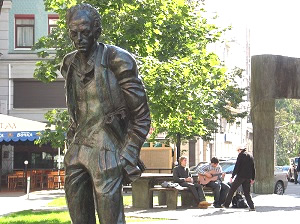
Bulat Okudzhava (9 mei 1924 – 12 juni 1997)
Monument in Moskou
De Amerikaanse dichteres Mona Van Duyn werd geboren op 9 mei 1921 in Waterloo, Iowa. Zie ook alle tags voor Mona Van Duyn op dit blog.
Three Valentines to the Wide World
II
I have never enjoyed those roadside overlooks from which
you can see the mountains of two states. The view keeps generating
a kind of pure, meaningless exaltation
that I can’t find a use for. It drifts away from things.
And it seems to me also that the truckdriver’s waste of the world
is sobering. When he rolls round it on a callus of macadam,
think how all those limping puppydogs, girls
thumbing rides under the hot sun, or under the white moon
how all those couples kissing at the side of the road,
bad hills, cat eyes, and horses asleep on their feet
must run together into a statement so abstract
that it’s tiresome. Nothing in particular holds still in it.
Perhaps he does learn that the planet can still support life,
though with some difficulty. Or even that there is injustice,
since he rolls round and round and may be able to feel
the slight but measurable wobble of the earth on its axis.
But what I find most useful is the poem. To find some spot
on the surface and then bear down until the skin can’t stand
the tension and breaks under it, breaks under that half-demented
“pressure of speech” the psychiatrists saw in Pound,
is a discreetness of consumption that I value. Only the poem
is strong enough to make the initial rupture,
at least for me. Its view is simultaneous
discovery and reminiscence. It starts with the creature
and stays there, assuming creation is worth the time
it takes, from the first day down to the last line on the last page.
And I’ve never seen anything like it for making you think
that to spend your life on such old premises is a privilege.
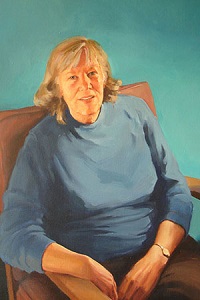
Mona Van Duyn (9 mei 1921 – 2 december 2004)
Portret door Marion Miller, 1993
De Egyptische schrijver Gamal al-Ghitani werd geboren op 9 mei 1945 in Guhaina, maar groeide op in Caïro. Zie ook alle tags Gamal al-Ghitani op dit blog.
Uit: Le Livre des Illuminations (Vertaald door Khaled Osman)
« ILLUMINATION DE LA PLENITUDE
Après quarante révolutions des astres, j’ai eu la vision de mon père: il s’est manifesté spirituellement à moi dans le néant du lieu, dans l’étrangeté du temps, dans un horizon ramassé et non étalé, dans des dimensions perçues faute d’être vues, entre des murs bâtis de matières inconnues de nous, qui n’étaient ni le bois ni la pierre; quant au toit, il était taillé dans une lueur écarlate dont la couleur était singulière, sans rapport avec notre spectre coutumier. Mon père était assis en face de moi, je le voyais de profil, dans une pose où je n’avais pas eu l’habitude de le voir. Je me suis avancé vers lui, le cœur battant, mû par un élan d’enthousiasme, mais au bout de quelques pas je me suis arrêté, incapable d’avancer davantage; du reste, toute velléité de mouvement m’a bientôt abandonné et je me suis résigné à l’immobilité.
Mon père m’est apparu dans des vêtements terrestres, une chemise en laine noire et un pantalon noir, ses cheveux étaient lisses, bien coiffés, d’une bonne longueur, ses traits étaient jeunes, détendus, sereins. À son visage encore dénué de toute ride, encore clair de tout souci, je lui ai attribué — dans cette apparition — une vingtaine d’années. Il m’a observé et je l’ai observé, mais alors qu’il a pu se rassasier de ma vue, je n’ai pas eu le temps de me combler de la sienne. Comme l’éternité s’approchait, j’ai sollicité la permission de dialoguer, et tout d’un coup mon père s’est mis à parler, sa voix est parvenue à mon ouïe, une voix monocorde, au timbre égal, il m’a parlé comme on parle à la radio, comme s’il adressait ses propos à des auditeurs inconnus, absents de son champ de vision; il s’est exprimé et j’ai bu ses paroles, il a parlé et j’ai consigné…
— Ne t’inquiète pas pour moi, Gamal, ne sois pas triste, ma mort s’est faite si tranquillement que je n’ai pas souffert, le passé et le présent se sont consumés en l’espace de sept minutes; les propos que t’a tenus ta mère, les récits que t’ont rapportés tes frères, tout est véridique, alors libère-toi de ce poids qui oppresse ta poitrine… Mais laissons cela. Dis-moi plutôt : à quoi vous occupez-vous?
Là-dessus, mon père a disparu.”
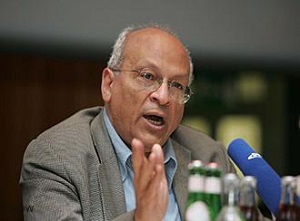
Gamal al-Ghitani (Guhaina, 9 mei 1945)
De Engelse schrijver Richard Adams werd geboren in Newbury op 9 mei 1920. Zie ook alle tags voor Richard Adams op dit blog.
Uit Watership Down
“They ran over the culvert. The grass was wet and thick near the stream and they made their way up the opposite slope, looking for drier ground. Part of the slope was in shadow, for the sun was sinking ahead of them, and Hazel, who wanted a warm, sunny spot, went on until they were quite near the lane. As they approached the gate he stopped, staring.
“Fiver, what’s that? Look!”
A little way in front of them, the ground had been freshly disturbed. Two piles of earth lay on the grass. Heavy posts, reeking of creosote and paint, towered up as high as the holly trees in the hedge, and the board they carried threw a long shadow across the top of the field. Near one of the posts, a hammer and a few nails had been left behind.
The two rabbits went up to the board at a hopping run and crouched in a patch of nettles on the far side, wrinkling their noses at the smell of a dead cigarette end somewhere in the grass. Suddenly Fiver shivered and cowered down.
“Oh, Hazel! This is where it comes from! I know now — something very bad! Some terrible thing — coming closer and closer.”
He began to whimper with fear.
“What sort of thing — what do you mean? I thought you said there was no danger?”
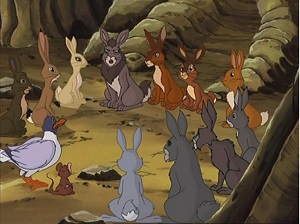
Richard Adams (Newbury, 9 mei 1920)
Scene uit de Britse animatiefilm uit 1978
De Schotse schrijver James Barrie werd op 9 mei 1860 in Kirriemuir nabij Dundee geborenZie ook alle tags voor James Barrie op dit blog.
Uit: The Adventures of Peter Pan
“Don’t go,” they called in pity.
“I must,” he answered, shaking; “I am so afraid of Peter.”
It was at this tragic moment that they heard a sound which made the heart of every one of them rise to his mouth. They heard Peter crow.
“Peter!” they cried, for it was always thus that he signalled his return.
“Hide her,” they whispered, and gathered hastily around Wendy. But Tootles stood aloof.
Again came that ringing crow, and Peter dropped in front of them. “Greetings, boys,” he cried, and mechanically they saluted, and then again was silence.
He frowned.
“I am back,” he said hotly, “why do you not cheer?”
They opened their mouths, but the cheers would not come. He overlooked it in his haste to tell the glorious tidings.
“Great news, boys,” he cried, “I have brought at last a mother for you all.”
Still no sound, except a little thud from Tootles as he dropped on his knees.
“Have you not seen her?” asked Peter, becoming troubled. “She flew this way.”
“Ah me!” once voice said, and another said, “Oh, mournful day.”
Tootles rose. “Peter,” he said quietly, “I will show her to you,” and when the others would still have hidden her he said, “Back, twins, let Peter see.”
So they all stood back, and let him see, and after he had looked for a little time he did not know what to do next.“
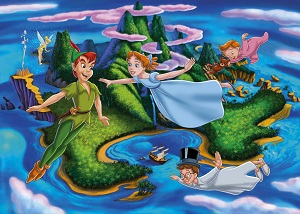
James Barrie (9 mei 1860 – 19 juni 1937)
Scene uit de Amerikaanse animatiefilm uit 1953
De Italiaanse schrijver Pitigrilli (pseudoniem voor Dino Serge) werd geboren te Turijn op 9 mei 1893. Zie ook alle tags voor Pitigrilli op dit blog.
Uit :Cocaine (vertaald door Eric Mosbacher)
“There’s still hope for you…. You haven’t yet got to the stage of tremendous depression, of insuperable melancholy. Now you smile when you have the powder in your blood. You’re at the early stage in which you go back to childhood.”
She spoke to him as to a child, though they were both of the same age. Cocaine achieves the cruel miracle of distorting time.”
(…)
“It’s comfortable and delightful. When I die they’ll shut me up in it forever, and all the happiest memories of my life will be in it…. It also offers another advantage. When it’s over I’m left alone, all alone; it’s the man who has to go away. Afterwards I find the man disgusting. Forgive me for saying so, but afterwards men are always disgusting. Either they follow the satisfied male’s impulse and get up as quickly as they do from a dentist’s chair, or they stay close to me out of politeness or delicacy of feeling; and that revolts me, because there’s something in them that is no longer male.”
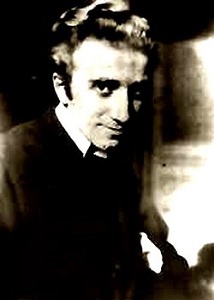
Pitigrilli (9 mei 1893 – 8 mei 1975)
In 1930
